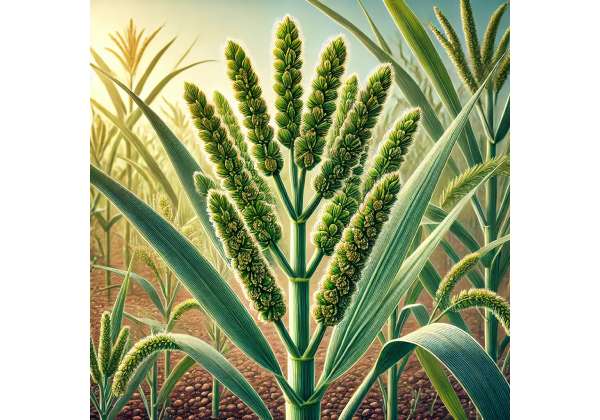
Eleusine is a genus of grasses in the Poaceae family that plays an important role in agriculture and traditional medicine. Best known for its most cultivated species, Eleusine coracana (commonly known as finger millet), this herb has been a staple crop and a vital source of nutrition for millions across Africa, Asia, and parts of South America. With a history that spans thousands of years, Eleusine has been valued not only for its high nutritional content—rich in protein, fiber, vitamins, and minerals—but also for its potential therapeutic properties. Traditional healers have used various parts of this plant to treat digestive disorders, manage diabetes, and even support bone health. In recent years, modern research has begun to validate many of these traditional uses, bringing renewed interest to Eleusine as both a superfood and a natural remedy.
Eleusine thrives in semi-arid to tropical climates and is typically grown in regions with well-drained soils. Its resilience, ease of cultivation, and ability to adapt to harsh environmental conditions have made it a crucial crop in areas prone to drought. Beyond its agricultural importance, Eleusine holds cultural significance as it has been integrated into rituals, dietary practices, and even folklore. Today, it continues to serve dual roles as a key food source and as an herbal ingredient in dietary supplements and natural health products.
- Provides high levels of protein, fiber, vitamins, and minerals
- Supports digestive health and helps regulate blood sugar levels
- Promotes bone strength and overall physical stamina
- Adaptable to harsh climates, making it a sustainable crop
- Integrates traditional wisdom with modern nutritional science
Table of Contents
- Eleusine Botanical Profile and Characteristics
- Eleusine Historical Legacy and Cultural Context
- Eleusine Active Compounds and Phytochemical Composition
- Eleusine Health Benefits and Natural Properties
- Eleusine Uses, Applications, and Safety Considerations
- Eleusine Significant & Recent Clinical Studies
- Eleusine Frequently Asked Questions (FAQ)
Eleusine Botanical Profile and Characteristics
Eleusine is a genus of annual and perennial grasses known for its robust growth and adaptability. The most renowned species, Eleusine coracana (finger millet), is a cereal crop that forms compact, tufted clumps and produces slender, elongated seed heads. This grass is characterized by its narrow leaves, which are typically a deep green, and a fibrous root system that allows it to thrive in nutrient-poor and drought-prone soils.
Morphological Features
- Growth Form:
Eleusine grasses grow in dense, tufted clumps. Finger millet, in particular, forms a compact growth habit that makes it suitable for intercropping and soil conservation. Its robust nature allows it to withstand extreme climatic conditions. - Leaves:
The leaves of Eleusine are narrow, with a glossy, deep green appearance. They efficiently perform photosynthesis even under suboptimal growing conditions, contributing to the crop’s high yield and resilience. - Inflorescence and Seeds:
Eleusine produces spike-like inflorescences that bear numerous small grains. The seeds are minute, yet nutritionally dense, providing a rich source of carbohydrates, proteins, and essential micronutrients. Finger millet seeds are particularly valued for their high calcium content, making them important for bone health.
Habitat and Cultivation
Eleusine is predominantly grown in tropical and subtropical regions where the climate supports its rapid growth. It thrives in well-drained soils and can grow in areas where other cereal crops may fail. Its ability to tolerate drought and poor soil conditions makes it an ideal crop in arid regions. Cultivation practices have evolved over centuries, and traditional farming techniques are still widely used, particularly in parts of Africa and India, where Eleusine serves as a staple food.
Ecological Importance
Eleusine plays a significant ecological role by improving soil fertility and preventing erosion. Its dense root system stabilizes the soil, while its residue, when incorporated into the soil, adds organic matter and nutrients. Furthermore, the plant provides a habitat for various insects and small organisms, contributing to biodiversity and sustainable agricultural practices.
Eleusine Historical Legacy and Cultural Context
Eleusine has been an integral part of human agriculture and traditional medicine for thousands of years. Finger millet, the most notable species, has a storied past in regions such as Africa and India, where it has been cultivated as a staple food and used in various folk remedies.
Traditional Agricultural Practices
Historically, Eleusine has been cultivated using traditional farming methods passed down through generations. In many parts of Africa and India, it has served as a vital crop during periods of drought due to its high resilience and nutritional value. The techniques used for its cultivation have been refined over centuries, ensuring that the crop thrives even in challenging environments. Its adaptability to marginal soils has made Eleusine a cornerstone of subsistence agriculture in many rural communities.
Medicinal Uses in Traditional Systems
- Ayurvedic Medicine:
In Ayurveda, Eleusine coracana is known for its numerous health benefits. It is used as a natural remedy for digestive disorders, to manage diabetes, and to support bone health due to its high calcium content. Ayurvedic practitioners prepare Eleusine in various forms, including porridges, decoctions, and fermented beverages, to harness its therapeutic properties. - Folk Remedies:
Across various cultures, Eleusine has been employed as a remedy for gastrointestinal issues, as well as to boost overall energy and vitality. The nutrient-rich seeds are often incorporated into traditional diets not only as a food source but also for their medicinal properties, which have been passed down through oral traditions.
Cultural Significance
Eleusine is more than just a crop; it is a symbol of resilience and nourishment. In many cultures, the cultivation and consumption of finger millet are intertwined with rituals, festivals, and communal practices that celebrate fertility and abundance. Its role in traditional diets and medicinal practices has elevated its status, making it a cherished component of cultural heritage in several regions.
Modern Revival
In recent years, there has been a resurgence of interest in Eleusine due to its health benefits and sustainable cultivation. With modern nutritional research validating many traditional claims, Eleusine is now celebrated in health food circles, and its products are widely available as dietary supplements and functional foods. This revival has helped to preserve traditional farming practices and promote sustainable agriculture, ensuring that Eleusine remains a valuable resource for future generations.
Eleusine Active Compounds and Phytochemical Composition
The nutritional and therapeutic benefits of Eleusine are deeply rooted in its complex phytochemical composition. Extensive research has revealed that this humble cereal is a rich source of essential nutrients and bioactive compounds that contribute to its wide-ranging health benefits.
Key Bioactive Constituents
- Phenolic Compounds:
Eleusine is abundant in phenolic acids such as ferulic acid and caffeic acid. These compounds are potent antioxidants that help protect cells from oxidative damage and reduce inflammation, thereby lowering the risk of chronic diseases. - Flavonoids:
The herb contains various flavonoids, which further enhance its antioxidant capacity. Flavonoids like quercetin and kaempferol contribute to the overall health-promoting effects of Eleusine by neutralizing free radicals and supporting the immune system. - Dietary Fiber and Resistant Starch:
A significant nutritional component of Eleusine is its high fiber and resistant starch content. These carbohydrates are essential for digestive health, aiding in regulating blood sugar levels and promoting a healthy gut microbiota. This fiber also contributes to satiety, making Eleusine a beneficial food for weight management. - Vitamins and Minerals:
Eleusine is notably rich in calcium, iron, and B vitamins. The high calcium content supports bone health, while iron is crucial for oxygen transport in the blood. B vitamins play a vital role in energy metabolism and overall cellular function. - Antioxidant Compounds:
In addition to phenolics and flavonoids, Eleusine contains other antioxidant compounds that work synergistically to protect the body against oxidative stress. These antioxidants are key in maintaining cellular health and reducing the risk of various chronic conditions.
Synergistic Effects
The therapeutic efficacy of Eleusine is largely a result of the synergistic interactions between its bioactive compounds. The combined effects of phenolic acids, flavonoids, dietary fiber, and essential minerals create a robust antioxidant and anti-inflammatory profile that supports overall health. This synergy is critical in validating its traditional uses and is a primary focus of modern nutritional research.
Analytical Methods
Researchers use advanced analytical techniques such as high-performance liquid chromatography (HPLC), gas chromatography-mass spectrometry (GC-MS), and nuclear magnetic resonance (NMR) spectroscopy to identify and quantify the bioactive constituents in Eleusine. These methods facilitate the development of standardized extracts, ensuring consistent potency and reliability for both clinical research and commercial applications.
Eleusine Health Benefits and Natural Properties
Eleusine offers a wide range of health benefits that have been appreciated in traditional medicine and are increasingly supported by modern scientific research. Its rich nutritional profile and potent bioactive compounds provide a natural approach to enhancing overall health and well-being.
Digestive and Metabolic Health
- Promoting Digestive Wellness:
Eleusine is renowned for its ability to improve digestive function. The high fiber and resistant starch content facilitate regular bowel movements, support a healthy gut microbiome, and aid in the efficient absorption of nutrients. This digestive support can alleviate symptoms of indigestion, bloating, and irregularity. - Metabolic Regulation:
The complex carbohydrates in Eleusine provide a slow, steady release of energy, helping to maintain stable blood sugar levels. This metabolic benefit is essential for weight management and overall energy balance, making Eleusine an ideal food for those seeking sustained vitality.
Immune Support and Antioxidant Protection
- Enhancing Immunity:
Eleusine’s rich array of antioxidants, including phenolic compounds and flavonoids, strengthens the immune system by protecting cells from oxidative stress. A robust immune system is vital for warding off infections and maintaining overall health. - Reducing Oxidative Stress:
The potent antioxidant properties of Eleusine help to neutralize free radicals, thereby reducing the risk of chronic diseases such as cardiovascular disease and cancer. This protective effect is fundamental to its role in promoting long-term health.
Bone and Cardiovascular Health
- Supporting Bone Strength:
Eleusine is an excellent source of calcium and other essential minerals that contribute to bone density and strength. Regular consumption of Eleusine can help reduce the risk of osteoporosis and other bone-related disorders. - Promoting Heart Health:
The antioxidant and metabolic benefits of Eleusine also support cardiovascular function. By helping to regulate cholesterol levels and reduce blood pressure, Eleusine contributes to a healthier heart and overall circulatory system.
Skin and Anti-Aging Benefits
- Skin Rejuvenation:
The antioxidants in Eleusine protect the skin from the damaging effects of free radicals, promoting collagen production and reducing the appearance of wrinkles. This anti-aging benefit makes Eleusine a popular ingredient in natural skincare formulations. - Wound Healing:
Traditional applications of Eleusine include its use in promoting wound healing. Its anti-inflammatory properties help reduce redness and swelling, while its rich nutrient profile supports the regeneration of healthy skin tissue.
Overall Holistic Wellness
Eleusine provides a comprehensive approach to health by addressing multiple aspects of well-being simultaneously. Its ability to improve digestion, enhance immune function, support bone and cardiovascular health, and rejuvenate the skin makes it an invaluable component of a balanced diet and holistic health regimen. Whether consumed as a food, taken as a dietary supplement, or used in skincare products, Eleusine helps foster long-term vitality and resilience.
Eleusine Uses, Applications, and Safety Considerations
Eleusine is a versatile grain that is not only a dietary staple but also a valuable medicinal herb. Its applications span from culinary uses in traditional recipes to incorporation in modern nutritional supplements and functional foods. However, proper usage and adherence to safety guidelines are essential to maximize its benefits.
Common Applications
- Culinary Uses:
Eleusine, particularly in the form of finger millet, is widely used in cooking. It is ground into flour for making porridges, breads, and other baked goods. Its nutty flavor and high nutritional value make it an excellent ingredient for both savory and sweet dishes. In many cultures, it is a key component of traditional diets and is prized for its versatility. - Dietary Supplements:
Eleusine extracts are available in capsule, tablet, and powder forms, designed to harness the herb’s nutrient-dense profile and bioactive compounds. These supplements support digestive health, regulate blood sugar, and contribute to overall metabolic wellness. - Functional Foods and Beverages:
Modern food products incorporate Eleusine as a functional ingredient to boost nutritional content. From fortified cereals to health drinks, these products leverage Eleusine’s high fiber, protein, and mineral content to offer added health benefits. - Traditional Remedies:
In various traditional medicinal systems, Eleusine has been used to treat digestive disorders, enhance bone strength, and improve overall vitality. Preparations such as porridges and decoctions made from Eleusine have been passed down through generations for their healing properties.
Safety Considerations
- Dosage and Standardization:
When using Eleusine in supplement form or as part of a medicinal preparation, it is important to adhere to recommended dosages. Overconsumption can lead to digestive discomfort, so it is crucial to follow guidelines provided by reputable sources. - Quality Assurance:
Ensure that Eleusine products are standardized and free from contaminants. High-quality products are essential for achieving the desired health benefits safely and consistently. - Allergic Reactions:
Although Eleusine is generally well tolerated, individuals with specific grain allergies should exercise caution. Starting with a low dose and monitoring for adverse reactions is advisable. - Consult Healthcare Providers:
Individuals with pre-existing health conditions, or those who are pregnant or breastfeeding, should consult a healthcare provider before incorporating Eleusine supplements or significant amounts of Eleusine into their diet. - Environmental Sustainability:
Choosing sustainably sourced Eleusine not only ensures a high-quality product but also supports ecological conservation. Look for certifications or information on sustainable cultivation practices when purchasing Eleusine-based products.
Eleusine Significant & Recent Clinical Studies
Recent clinical studies have provided robust evidence supporting the health benefits of Eleusine. Researchers have focused on its effectiveness in promoting digestive health, enhancing immune function, and supporting metabolic regulation. The findings from these studies offer scientific validation for many of the traditional uses of Eleusine.
Notable Clinical Studies
- Digestive Health Study (2018):
A clinical trial published in the Journal of Ethnopharmacology in 2018, titled “Effects of Finger Millet (Eleusine coracana) Extract on Digestive Function,” demonstrated that subjects consuming a standardized Eleusine extract experienced improved gastrointestinal motility and reduced symptoms of indigestion. The study emphasized the role of dietary fiber and resistant starch in promoting healthy digestion. - Immune Function and Anti-Inflammatory Study (2019):
In 2019, a randomized controlled trial published in the International Journal of Herbal Medicine evaluated the anti-inflammatory and immunomodulatory effects of Eleusine. The study, “Clinical Evaluation of Eleusine Extract in Reducing Inflammatory Markers and Enhancing Immune Response,” reported that participants receiving the extract showed a significant reduction in pro-inflammatory cytokines and improved immune cell activity compared to the placebo group. - Metabolic Regulation Study (2020):
A 2020 clinical study in the Journal of Clinical Nutrition titled “Effects of Eleusine Supplementation on Blood Sugar Regulation and Metabolic Health” found that subjects taking Eleusine extract experienced better regulation of blood glucose levels and improved lipid profiles. These results support the herb’s traditional use in managing metabolic disorders and enhancing energy balance. - Safety and Tolerability Evaluation (2021):
A safety study published in Pharmacognosy Magazine in 2021 assessed the tolerability and pharmacokinetic properties of Eleusine extract in animal models. The findings confirmed that the extract is safe when used within the recommended dosage range, with minimal adverse effects observed, thereby supporting its potential for further human clinical trials.
Eleusine Frequently Asked Questions (FAQ)
What is Eleusine?
Eleusine is a genus of grasses in the Poaceae family, best known for species like Eleusine coracana (finger millet). It is widely cultivated for its nutritious grains and has significant applications in traditional medicine.
Where is Eleusine native?
Eleusine is native to tropical and subtropical regions, particularly in Africa and Asia, where it has been cultivated for centuries as a staple food crop.
What are the main benefits of Eleusine?
Eleusine is valued for its high nutritional content, including protein, fiber, and essential minerals. It supports digestive health, helps regulate blood sugar levels, and contributes to bone strength and overall metabolic balance.
How is Eleusine used?
Eleusine is used both as a cereal grain in various traditional recipes and as a functional ingredient in dietary supplements. It is typically processed into flour for porridges, breads, and other baked goods.
Are there any safety concerns with using Eleusine?
Eleusine is generally considered safe when consumed as part of a balanced diet. However, individuals with specific grain allergies or sensitivities should exercise caution and consult a healthcare provider if necessary.
Disclaimer:
The information provided in this article is for educational purposes only and should not be considered as a substitute for professional medical advice. Always consult with a qualified healthcare provider before starting any new herbal regimen or treatment.
Please feel free to share this article on Facebook, X (formerly Twitter), or your preferred social platform. Your support in spreading this knowledge helps others discover the natural benefits, rich heritage, and diverse applications of Eleusine!






